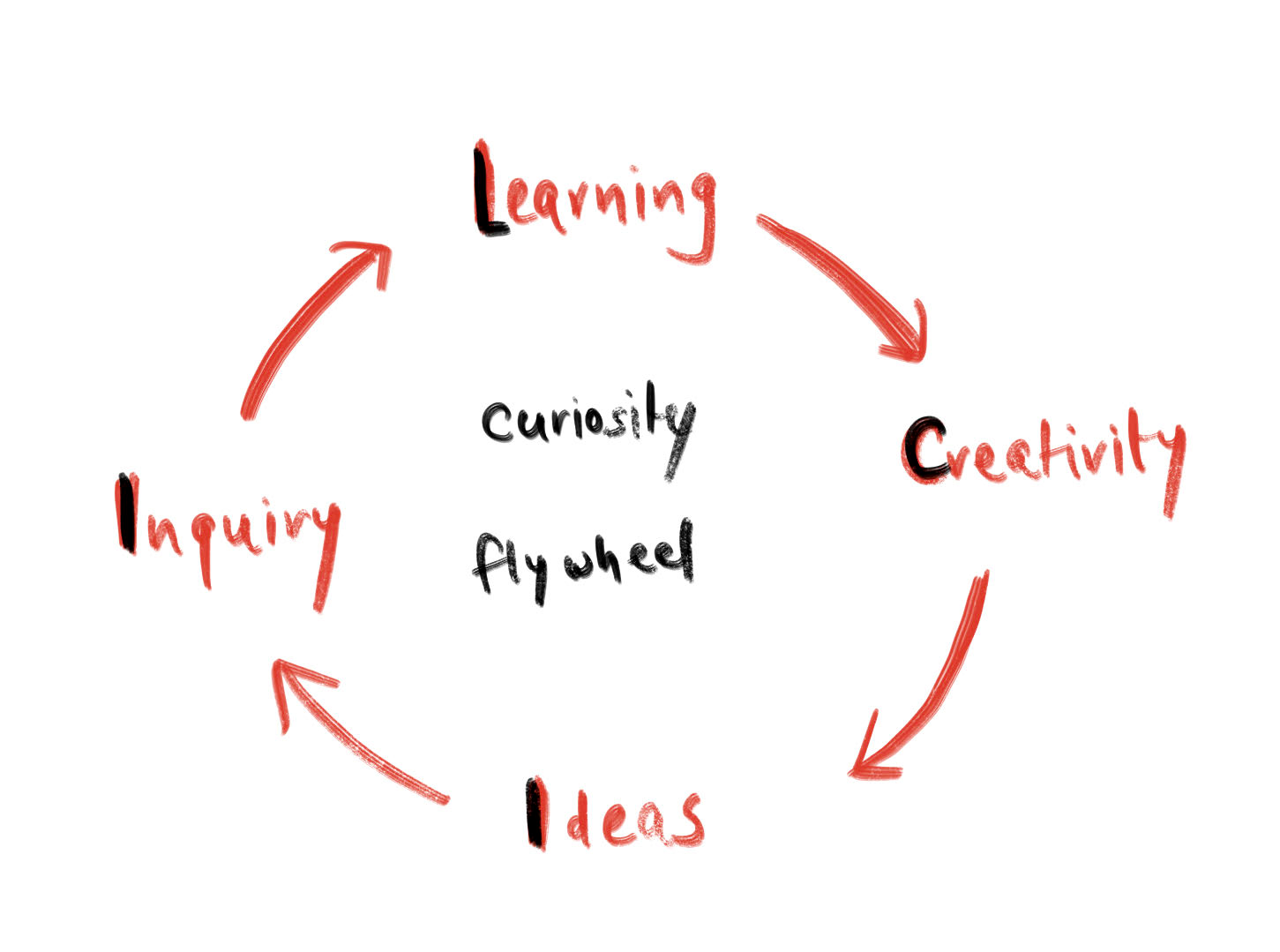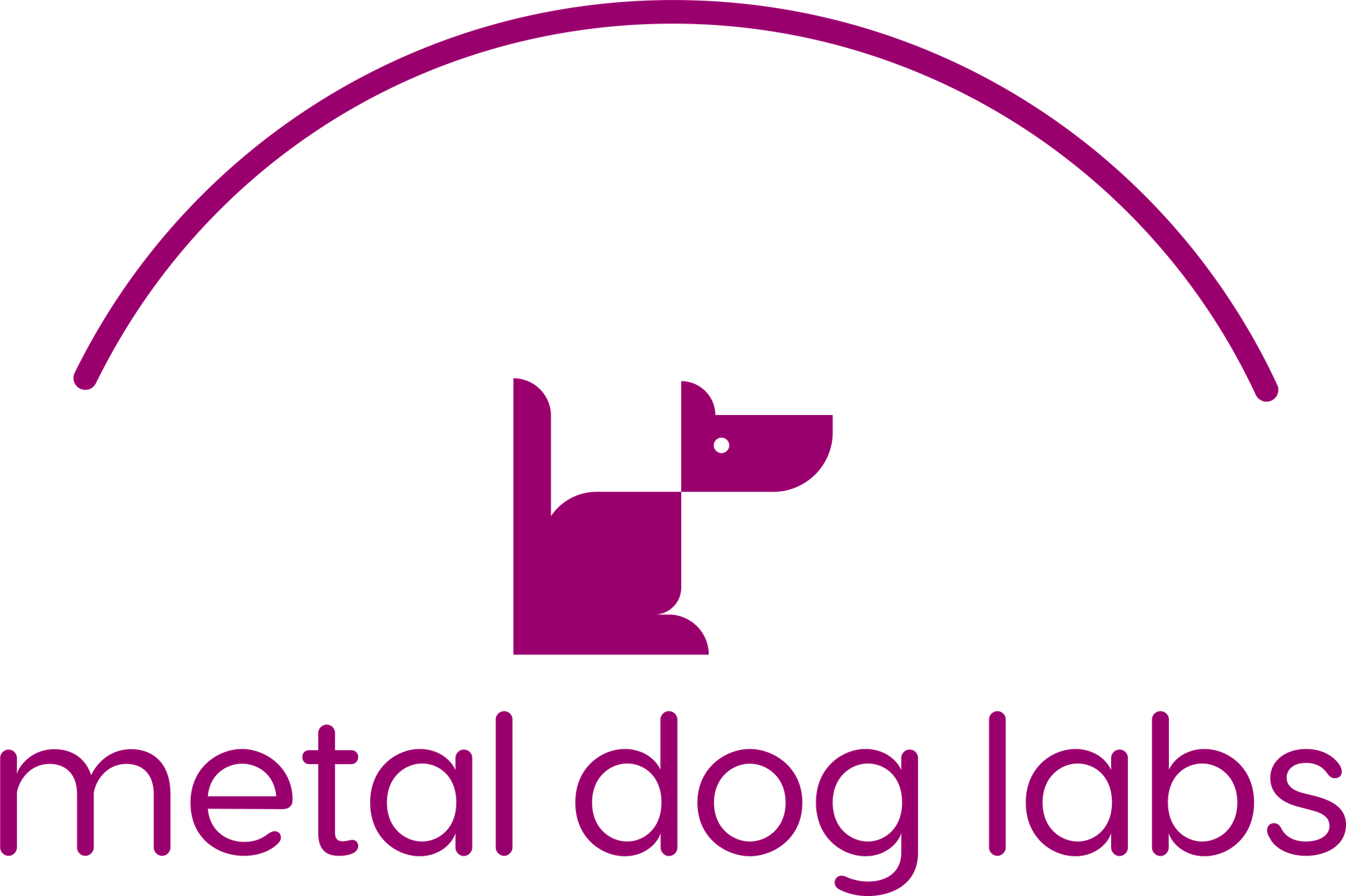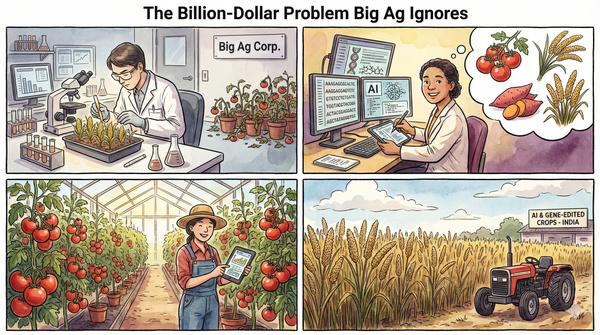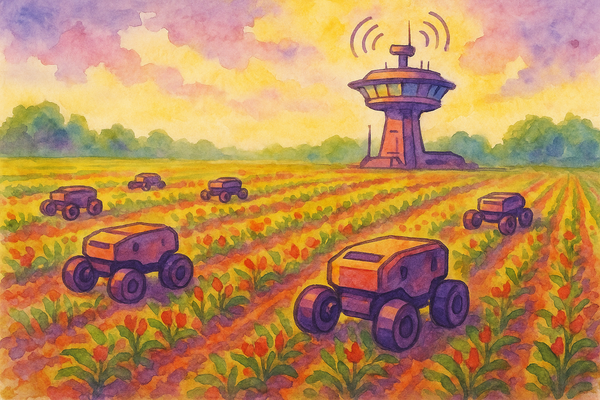The Curiosity Flywheel
A call to arms to have more independent voices

Over the last 5-7 years, we have seen many new newsletters, podcasts, video channels talk about agriculture and food systems. Have we reached peak newsletter/podcasts in this space (Agriculture / Agtech) or is there room for more?
I. Meh or Hey!!?
After the World Agritech event in San Francisco in 2023, as I reflected on the event, the need for independent and unique voices in the industry was quite clear.
Oftentimes large corporations have to walk a very thin line in their messaging to the industry. When one of the few paths for exits for startups is an acquisition by one of the large incumbents, it limits what these startups can say and how they say it. The messaging for large corporations is tightly controlled by press and legal teams, which push for lower risk in their communications. This leads to messaging and communications which are often “meh!”
The agriculture industry is huge, complicated, and varied. One could spend a lifetime and still understand only some parts of it in any level of detail.
There is a need for unique, and objective voices in the industry, which investigate, explore, explain, and imagine a better future. The industry is large and we need to look at problems from different perspectives to understand problems, come up with creative solutions, and make a difference.
The explosion of new tools across Substack, TikTok, Youtube, Twitter, Instagram, and a host of other tools like ConvertKit, MailChimp have made it relatively easy to put your thoughts out there on the internet.
We need these voices in the industry to help us make sense of the complicated world of agriculture and food systems.
II. Is a crowded space getting more crowded?
Over the last few years, there have been quite a few newsletters, podcasts, social media groups, YouTube channels etc. focused on problems related to agriculture and Agtech in different parts of the world. Creators like Tim Hammerich, Shane Thomas, Janette Barnard, Venky Ramachandran, Sarah Nolet, etc. have established credibility and trust with their audience. They have done it through analysis, an interesting perspective, thought provoking and oftentimes provocative stances, and most importantly through their unique voice.
So is there a need and space for more content out there? Do we have too much content out there?
Given the onslaught of newsletters, youtube channels, podcasts, and social media messages, it might feel there is not enough space in the market.
Is that true?
For example, my esteemed colleague (at Mineral, an Alphabet company) and friend Ariel Patton has come out recently like a breath of fresh air with Topsoil, and has quickly established her voice.
Just last week, my friend Avery Simundsson from Canada started a newsletter to explore the impact of the social and regulatory atmosphere,
“The social and regulatory atmosphere can have a major impact on how efficiently, sustainably, and humanely we produce food. This newsletter provides one person’s commentary on how current social and regulatory pressures are shaping the agricultural industry, and what it means for society.”
Fall Line Capital launched a podcast at the beginning of May 2023 called FieldNotes to go with their blog.
The world of agriculture is large, complex, and material to the existence of humanity. Food production has both positive and negative impacts on climate change. Climate change, food security, nutrition, access to clean air and water are some of the defining issues of our lifetimes. These issues are interconnected and we need a large number of viewpoints coming at it from different angles.
Based on this, I strongly believe there is space for at least another 1000 newsletters, podcasts, and video channels in the world of agriculture.
(Yes you got that right, 1 with three zeros and more!)
III. Questions to tackle for independent voices
Many times folks who want to write (or create videos etc.) about agriculture and/or tech (or any other topic for that matter) have some version of the following questions in their mind.
1. “Why should anyone care about what I have to say?”
It can be very disheartening if you put something out there, and no one notices. But that is the reality initially, as no one knows about you. Use your network of friends and family to support you in those early days. You should worry less about who’s engaging with it, and more about whether you are putting out YOUR perspective in an interesting manner or not. You should not worry about anything else - just focus on being authentic, having your own voice, and high quality work.
2. “I am scared to put my opinions out there”
If you think not many people are going to care about what you put out there, then you shouldn’t be scared to put your opinions out there to begin with.
3. “I cannot be like Shane Thomas. He is a content and analysis machine, and whatever I do I cannot be like Shane.”
Yes you are right! Shane is prolific and amazing. You cannot be like Shane, however hard you try.
“So what are you saying, I shouldn’t even try?”
The goal for you is to not be like anyone else. When someone engages with Shane’s writing, they want to hear Shane’s opinion.
When someone decides to engage with your writing, they want to hear your perspective, opinion, and voice.
The only person who can be like Shane is Shane.
So your goal is to be like you, and no one else.
We want to hear from YOU.
The great philosopher Snoop Dogg said the following and it applies,
“Once you be you, who could be you, but you”
“Well I don’t know what I should write, podcast, Tweet, or create a video about.”
There are three types of creative things you can do. I will mention this in the context of writing, but it applies to any type of creative pursuit, whether it be podcasting, Youtube videos, Twitter threads, art, you name it.
- You are saying something so unique and so new that no-one else has ever said it before. If you think you can do that on a consistent basis, you are either a genius or you are delusional. Please guide us to a better future.
- You are repeating exactly what someone is saying - this is yawn worthy - don’t do it. This is what Snoop said in the video above.
- You have your own slightly different perspective and/or talk about topics in a unique voice. This is where the gold lies - focus on it, but do in a way so that you are your authentic self, are kind, and helpful, and play a positive sum game.
If you are having trouble with ideas to write about, fire up your favorite generative AI engine, and ask questions. I asked a Generative AI engine the following question.
Provide a list of 20 topics to write a blog about drones in agriculture
- An introduction to agricultural drones: Types, applications, and benefits
- Crop scouting with drones: Efficiently monitoring crop health and identifying issues
- Drone-based precision spraying: Revolutionizing pesticide and nutrient application
- Drones and plant breeding: Accelerating the development of new crop varieties
- Drones in precision irrigation: Identifying water stress and optimizing water usage
- Using drones for variable rate application: Tailoring inputs for site-specific management
- The role of multispectral and hyperspectral imaging in drone-based agriculture
- Thermal imaging with drones: Detecting plant stress and optimizing crop performance
- Drones and livestock management: Monitoring animal health, location, and grazing patterns
- Drone-assisted soil mapping: Improving nutrient management and soil conservation
- Agricultural drones and artificial intelligence: Maximizing data analysis for decision-making
- The economic benefits of using drones in agriculture: A cost-benefit analysis
- Integrating drones into farm management software for streamlined operations
- The regulatory landscape for agricultural drones: Navigating rules and restrictions
- Drone safety and security in agriculture: Best practices and risk mitigation
- Agricultural drone training and certification: Preparing the next generation of drone operators
- Drones in sustainable agriculture: How UAV technology supports environmentally friendly farming
- The future of agricultural drones: Emerging technologies and potential applications
- Case studies: Successful drone applications in agriculture around the world
- Overcoming challenges to widespread adoption of drones in agriculture
So lack of topics should not be an excuse.
IV. The Curiosity FlywheelTM
So how should one go about doing it?
If you have ever heard a podcast done by Tim Hammerich (Future of Agriculture), you can feel his sense of innate curiosity. Tim is genuinely curious to learn, to engage with new ideas, and to use the process to bring his audience along on the journey. You see this with almost all creators: Tyler Cowen, Russ Roberts, Amit Varma, etc.
Curiosity is a strong catalyst.
Being curious can kickstart a flywheel effect. (Most of you are familiar with the Amazon flywheel, the data flywheel etc.)
A curiosity flywheel can and will enrich your life. The rest of us get the benefit of your ideas, and creativity.
So how does a curiosity flywheel work? A sense of inquiry (or curiosity) leads to learning, learning leads to creativity, which leads to new ideas, and which feeds into your level of inquiry, to continue to crank the flywheel.

The side benefits of the curiosity flywheel (on top of a learning process) include connections with interesting people all around the world, new friendships, serendipity, and a richer life!
V. What is success?
How should one think about success?
This is a very tricky topic. The most common metric is the number of readers (or subscribers or views or some version of it).
When I started writing “Software is Feeding the World”, a couple of years ago, I used to check my subscriber number multiple times a day. Six months into the learning journey, I stopped looking at the number of subscribers/views/readers after I realized two things:
- The act of creation through a process of curiosity and learning, and about thinking about a problem from different angles was a reward in itself.
- I was energized, when I could have a 1 x 1 vigorous conversation with someone I didn’t know, and especially in an area I didn’t know much about.
For me, very early on, the definition of success (or scale) changed from the number of subscribers to the number of engaging conversations I can have on a weekly basis (My current target is 2-3 new conversations every week, which means I talk with about 80-100 new people every year).
(There are other definitions of success as well. For example, Kevin Kelly has written about 1000 true fans or Rob Hardy has written about 100 true friends.)
And I hope to do it for the foreseeable future. Longevity is a consideration for me. I want to continue writing for a long time.
It is important for you to define your own success. Do not try to chase metrics which don’t give you energy, and focus on the ones which matter to you, whatever they are.
As Tim Hammerich once said to me,
“At the end of the day, whatever keeps you happy, healthy and engaged is priority number one”
VI. Just Do It!
So what are you waiting for?
Be curious, inquire, and crank up the curiosity flywheel.
We would love to hear your perspective.





